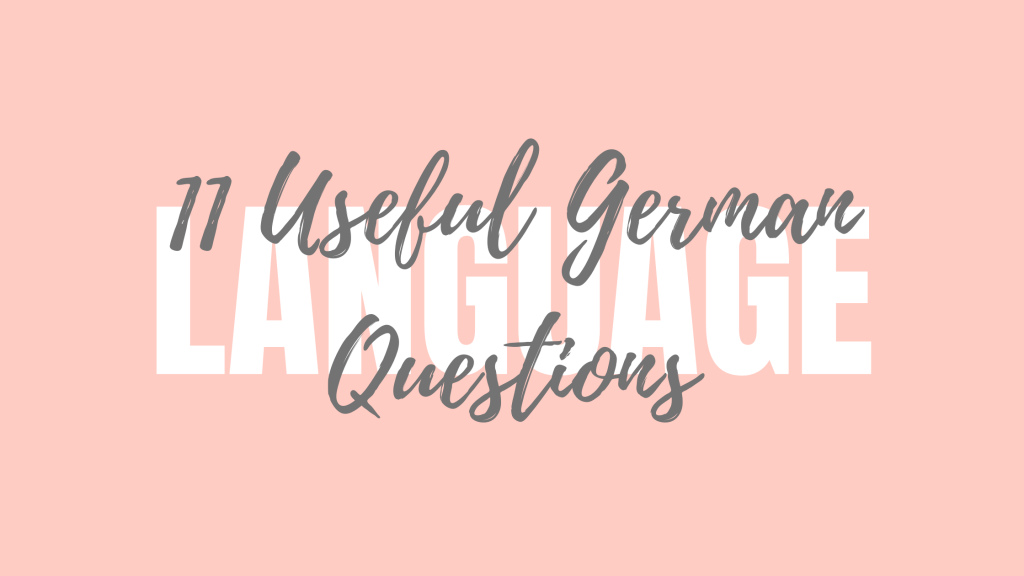This week, I’m going to share with you 11 genuinely useful German question phrases. Language learning apps such as Duolingo provide a great foundation with grammar and basic sentence structure. But as we’ve learnt from some of my previous posts, the phrases they give you aren’t exactly useful for everyday life!
We have also noticed there seem to be a lot more UK cars on the roads here at the moment. I think partially to do with coronavirus putting a lot of people’s “normal” holiday plans on hold, and also with the Brexit deadline looming ever closer, Brits are wanting to take advantage of the sweet EU open border deal that’s about to close up.
German is an official language of 6 EU countries (Germany (obvs), Austria, Lichtenstein, Belgium, Luxembourg and Switzerland) and is also widely spoken in the South Tyrol region of Italy. Of course, English is almost always spoken in all of these countries, but if you want to get fancy and smug about your language skills, here are 11 great question phrases you can use when travelling around German-speaking countries!
Können Sie das bitte wiederholen?
ENG: Can you please repeat that?
Particularly useful in South Germany, Switzerland and Austria. The accents and dialects will definitely catch you out! You can also simply use “Wie bitte?” which essentially means “Come again?” but it’s more polite to use the full question above.
Wo müssen wir aussteigen / wo müssen wir umsteigen?
ENG: Where do we have to get off? / Where do we have to change?
A great phrase if you’re travelling by train or any other public transport. You’ll hear these words a lot over the tanoy system as well, so it’s particularly useful to get used to the differences between aussteigen (to get off), einsteigen (to get on) and umsteigen (to change).
Können Sie uns was empfehlen?
ENG: Can you recommend something to us?
If you feel like there is still a certain romance in asking locals for local tips instead of just trawling Google Maps and Trip Advisor, then this phrase and the next two phrases are super handy!
Wo kann man hier ausgehen / wo kann man etwas trinken gehen?
ENG: Where can you go out here? / Where can you go for some drinks?
Be careful not to confuse the word ‘man’ (you, general) with the word ‘Mann’ (a male)!
Ist das in der Nähe?
ENG: Is that nearby?
Great to ask if somebody has just answered your recommendation question.
Können Sie mir das einpacken?
ENG: Can you box that up for me?
If you’ve never been to Germany before, and I’m specifically thinking about Bayern here, then get ready for some serious portion sizes! I would highly recommend not getting distracted by the side order menu in a restaurant or pub because I can absolutely guarantee you that your main meal will be more than enough to fill you up.
Wie kommen wir dahin?
ENG: How do we get there?
Somebody has recommended a great spot to visit and, great news, it’s nearby! But you are on a Google free holiday so you need to know how to get there. Here is your question for that!
Können Sie mir bitte die rechnung bringen? / Können wir bitte bezahlen?
ENG: Can you please bring me the bill? / Can we pay please?
You can also simply catch the eye of the waiter and say “die Rechnung bitte” BUT we are going to try hard to use full German sentences, AREN’T WE?
Haben Sie einen Tisch für zwei Personen?
ENG: Do you have a table for two?
Again, if you’re feeling extra lazy, “einen Tisch für zwei bitte” when you first go into a restaurant is also sufficient, but it’s more polite to ask nicely.
Wo sind die Toiletten?
ENG: Where are the toilets?
Possibly the most essential question if, like me, you drink 4 liters of water a day and have a small bladder. Be careful though, unless you’re in a restaurant/pub/cafe, you are likely to have to pay to pee (service stations included). Most places charge between 0,50 € and 0,70 € and you will probably get that money back in the form of a voucher to spend in the shop/convenience store inevitably attached to said service station/train station etc.
Wie spät ist es? / Wie viel Uhr ist es?
ENG: What time is it?
Probably also a good idea to familiarise yourself with the german numbers up to 24 and get used to reading a 24 hour clock. Although if you happen to be in rural southern Germany where they speak with a thick Bayern dialect nicknamed Farmer’s German, well, I can only wish you good luck with that. Not even the Germans themselves understand it.
I hope you enjoyed this week’s blog. It’s a little different. I tried my hardest with my accent in the audio, but if any Germans out there want to correct me (and I know you do!) then please feel free to drop me a message. I’m working really hard to improve my speaking skills!
I really enjoyed creating this, so please let me know if it’s something you’d like to see more of!
bis zum nächsten Mal / until next time,
Steffi x
